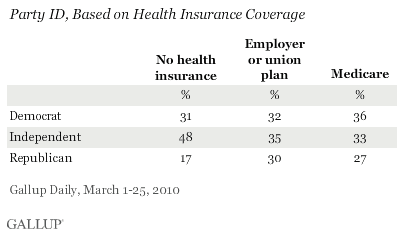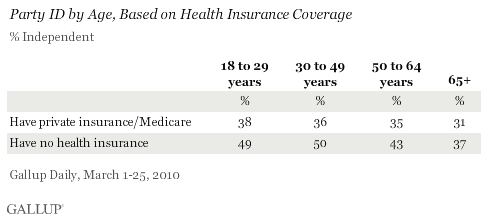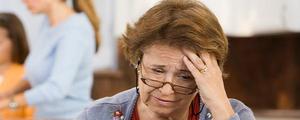PRINCETON, NJ -- Uninsured Americans -- those who stand to benefit the most from healthcare reform -- are less Democratic and more independent than one might assume. Nearly half of the uninsured, compared with roughly a third of Americans with private insurance or Medicare, are politically independent.

Given this finding from Gallup Daily tracking in March, passing healthcare legislation did not merely cater to the Democrats' base, but could potentially expand it among the uninsured themselves, who may now have more reason to support Democrats. Gallup polling immediately after the healthcare vote found 58% of uninsured Americans, compared with 45% of insured Americans, favoring the bill.
The net effect among all independents won't necessarily be positive, however, as nearly 80% of that group currently has health insurance, and independents are almost evenly split on whether passage of the healthcare bill was a good thing or a bad thing.
Uninsured More Independent at Every Age Level
Although the uninsured are clearly younger, on average, than the insured, age alone does not account for the tendency of the uninsured to be politically independent. At every age level, those without health insurance are more likely to be independent and less likely to be Republican than their insured counterparts.

Survey Methods
Results are based on telephone interviews with 24,147 national adults, aged 18 and older, conducted March 1-25, 2010, as part of Gallup Daily tracking. For results based on the total sample of national adults, one can say with 95% confidence that the maximum margin of sampling error is ±1 percentage point.
The views of insured Americans (private health insurance or Medicare) are based on interviews with 17,101 national adults, and have an associated margin of sampling error of ±1 percentage point. The views of uninsured Americans are based on interviews with 2,531 national adults, and have an associated margin of sampling error of ±3 percentage points.
Interviews are conducted with respondents on land-line telephones and cellular phones.
In addition to sampling error, question wording and practical difficulties in conducting surveys can introduce error or bias into the findings of public opinion polls.
